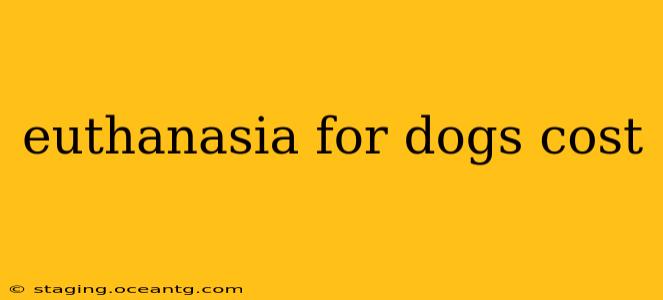Saying goodbye to a beloved canine companion is one of the hardest decisions a pet owner will ever face. When the time comes to consider euthanasia for your dog, understanding the associated costs and the process itself is crucial for making informed choices during an emotionally challenging period. This guide explores the financial aspects of dog euthanasia and other factors to consider.
What is the average cost of euthanasia for a dog?
The cost of euthanasia for a dog varies significantly depending on several factors. These include your geographic location, the veterinary clinic's pricing structure, and any additional services you choose. Generally, the cost ranges from $50 to $300. However, this is just the base cost; additional fees can significantly increase the total.
Factors Affecting the Cost of Dog Euthanasia:
- Location: Costs tend to be higher in urban areas compared to rural settings.
- Veterinary Clinic: Different clinics have different pricing structures. Some may offer packages including aftercare, while others charge separately for each service.
- Aftercare: This can encompass cremation (individual or communal), burial, or simply taking your dog home. Cremation options especially can substantially increase the total cost. Individual cremation, where the ashes are returned to the owner, is generally more expensive than communal cremation.
- Additional Services: The need for additional medications to sedate your dog before euthanasia, or treatment for underlying conditions, can add to the expense. Home euthanasia services also typically cost more than in-clinic euthanasia.
- Emergency situations: If your dog needs emergency care before euthanasia, this will add significantly to the overall cost.
What are the options for aftercare after dog euthanasia?
After saying goodbye, many pet owners want to make arrangements for their pet's remains. Options include:
- Private Cremation: The ashes are returned to you in an urn. This is generally the most expensive option.
- Communal Cremation: Your pet's remains are cremated with other pets, and the ashes are not returned. This is the most budget-friendly option.
- Burial: This is an option if you have land suitable for burial, or if you utilize a pet cemetery. Regulations concerning pet burial vary by location.
- Taking your dog home: Some owners choose to take their dog home, allowing for a private goodbye and disposal at home. This is usually the least expensive option but requires careful consideration.
How can I prepare for the financial costs of euthanasia for my dog?
Planning ahead can alleviate some of the financial stress during a difficult time. Several strategies can help:
- Pet Insurance: Pet insurance policies may cover a portion of the cost of euthanasia, although coverage varies greatly by policy. Review your policy documents to understand your coverage.
- Emergency Fund: Setting aside a dedicated emergency fund specifically for unforeseen pet-related expenses can be beneficial.
- Open Communication with your Veterinarian: Discuss payment options upfront with your veterinarian to understand all potential costs.
Does pet insurance cover euthanasia?
While some pet insurance plans offer coverage for euthanasia, it's not universally included. Coverage often depends on the specific policy and the underlying cause of needing euthanasia. It's essential to carefully review your pet insurance policy details to determine your coverage. Many policies cover the related costs of veterinary care leading up to the decision for euthanasia, but not the euthanasia procedure itself.
Where can I find affordable euthanasia services for my dog?
Finding affordable services requires researching veterinary clinics in your area. Contact several clinics to inquire about their pricing and payment options. You might also consider contacting local animal shelters or rescue organizations, although their services might be limited depending on the circumstances. Remember that the cheapest option is not always the best option. Choose a vet you trust and feel comfortable with.
This guide provides general information and should not substitute advice from your veterinarian. Always discuss your dog's specific needs and circumstances with your veterinarian to determine the most appropriate course of action. This is a deeply personal decision, and choosing a veterinarian you trust is paramount.
